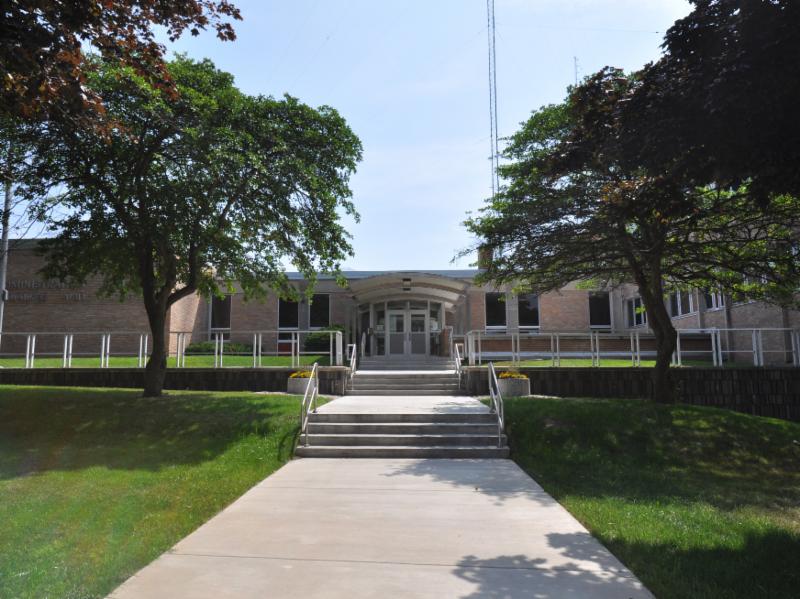How Should MPS Use Rainy Day Fund?
Typically used for school emergencies. Union pushes to use it to hire more staff.

Milwaukee Public Schools Office of School Administration, 5225 W. Vliet St. Photo courtesy of Milwaukee Public Schools.
“There is a contingency fund; there is a rainy-day fund… It’s raining; it’s pouring!” declared Amy Mizialko, president of the Milwaukee Teachers Education Association (MTEA), at a recent meeting of the Milwaukee Public Schools (MPS) board’s budget committee
The contingency fund she referred to is known as the unreserved fund balance that virtually every school system has to pay for unexpected expenditures that may pop up during the school year. The “rain” she was referring to was the school district’s problem recruiting and maintaining educators.
So exactly what is the unreserved fund balance, and how critical is the educator shortage in MPS? Let us deal with the second issue first.
In the July 2018 budget, the new school superintendent, Keith Posley, reversed the cuts to schools made by former superintendent Darienne Driver and restored teachers and other in-school educator positions. This year’s budget calls for an increase of 62 teachers and 22 support staff positions even though there’s a slight decrease in student enrollment projected.
However, an increase in positions does not always translate into the hiring of qualified educators. A couple hundred positions may be difficult to fill this fall because of low pay and more difficult working conditions. Several teachers spoke before the budget committee outlining how many of their fellow educators were leaving MPS for suburban districts where they could earn as much as $10,000 per year more with lower class sizes. And given the good economy, others are finding more lucrative positions outside of education.
What the MTEA is suggesting is that MPS should use much of the unreserved fund balance for educators’ raises in order to keep them in MPS and help attract additional employees.
So how is this fund’s money used? One example: The MPS health insurance is self-funded (with United Healthcare paid a fee to maintain the program), and a handful of unexpected medical procedures or emergencies over and above the usual annual rate can result in millions of dollars being tapped from this fund.
Another example: Every year MPS finds itself in court or at least involved in legal settlements. In many cases MPS wins, but a loss of one case can translate into a multi-million payout.
Throw in a school boiler that goes down or repairs not covered by insurance, and you can see more money going out the door. Or school board members can come up with some last-minute pet projects that may grab some of the money.
Yet there are some years where fewer disasters take place, and the district finishes the year with a modest unassigned fund balance.
This year there is a wild card – the Wisconsin state budget. Dan Rossmiller and Chris Kulow work for the Wisconsin Association of School Boards in government relations. According to them, the Republican-controlled Legislature and Democratic Governor Tony Evers are deadlocked on school funding. Both the Legislature and Evers generally agree on an overall increase in general school funding of just over $200 per child. But Evers wants to increase special education funding by $60 million, matching the commitment the state made years ago to fund two-thirds of special education.
The new state budget should go into effect July 1st, but the state sometimes misses that deadline by a few months. If the budget is not set by the July deadline, the state operates on funding based upon the previous year.
“The world will not end,” says Rossmiller, if the state does not meet this deadline. Schools do not receive any state funding for the school year anyway until after the third Friday in September and that day’s student enrollment count. School districts like Milwaukee, which receive a considerable amount of the operating revenue through state aid, borrow funds short term to cover expenses. Property-rich districts receive less funding from the state and may even cover expenses from the carryover of local funds from the previous school year.
But what happens if this year the government remains deadlocked for months on end? That is what happened in Illinois which operated without a state budget for over two years: 2015-2017. Rossmiller and Kulow believe that is unlikely to happen, but never say never.
Any district which bases its budget on a presumed state aid increase and maintains an insignificant unassigned fund balance, could find itself in real trouble. The MPS budget is traditionally conservative, based only upon the previous year’s state allocation, until the state budget is finalized. Even so, if the district meanwhile draws down its unassigned fund balance, that would leave no margin for error if unexpected expenditures arise or a budget deadlock would continue.
The most likely scenario in giving employee raises is for MPS to wait until final state funding is set. But while that may seem the most fiscally responsible thing to do, it’s questionable if a promise of possible raises down the road will have much impact in keeping educators in MPS or attracting new employees.
Either scenario could leave problems raining down on MPS, which could leave board members arguing over which potential leak in the roof they want to fix.
Terry Falk is a retired Milwaukee Public Schools teacher and former Milwaukee school board member.
The Educator
-
The School Policing Blindspot
 Jul 14th, 2020 by Terry Falk
Jul 14th, 2020 by Terry Falk
-
The Rationale for MPS Referendum
 Jan 14th, 2020 by Terry Falk
Jan 14th, 2020 by Terry Falk
-
How Does Residency Change Affect Teachers?
 Jan 2nd, 2020 by Terry Falk
Jan 2nd, 2020 by Terry Falk





















